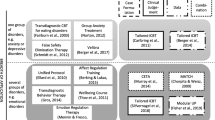Abstract
In his contribution to the 1956 Roundtable, Leslie H. Farber asserts that what lies beyond theory and training is the ability of the therapist to know the patient, not just know about the person. This provides the possibility of meeting, the mutual encounter, which Buber calls the I-Thou relationship. Farber also explores the relationship of meeting to transference and talks about the importance of both speaking truthfully and the mutuality of the relationship to be defined in terms of human experience.
Similar content being viewed by others
Notes
Around the time of these Round Table discussions in 1956, Dr. Leslie H. Farber, then Chairman of the Washington (D.C.) School of Psychiatry, conceived of the idea of bringing Martin Buber to America to give the Fourth Annual William Alanson White Memorial Lectures in March and April of 1957 in Washington (described by Friedman, 1988, p. 205).
In his “Lying on the couch,” Farber (1966b) addresses the difference between speaking truthfully [his preference] as opposed to speaking the truth [which became a rarefied concept in our work, in his opinion].
References
Clark, A. E. (1981). Dr. Leslie Farber, 68, leading theoretician of psychiatric school. The New York Times. March 27. Retrieved from http://www.nytimes.com/1981/03/27/obituaries/dr-leslie-farber-68-leading-theoretician-of-psychiatric-school.html.
Eckardt, M. H. (2006). Celebrating the 50th anniversary of the American academy of psychoanalysis and dynamic psychiatry. Journal of the American Academy of Psychoanalysis, 34, 5–12.
Farber, L. H. (1957). What is effective in the therapeutic process? A round table discussion. American Journal of Psychoanalysis, 17, 26–30. Republished here.
Farber, L. H. (1966a). The ways of the will: Essays toward a psychology and psychopathology of will. New York, London: Basic Books.
Farber, L. H. (1966b). Lying on the couch. In The ways of the will: Essays toward a psychology and psychopathology of will (pp. 3–20). New York, London: Basic Books.
Farber, L. H. (1976). Lying, despair, jealousy, envy, sex, suicide, drugs, and the good life. New York: Basic Books.
Friedman, M. (1988). Martin Buber’s life and work. Detroit, MI: Wayne: State University Press.
Mitchell, S. A. (1999). Where are you in all of this? Leslie Farber’s “Will” in contemporary psychoanalytic thought. In: Special Feature: Remembering Leslie H. Farber. Introduction by Robert Boyers, pp. 268–278. Salmagundi, No. 123, Summer 1999, Skidmore College.
Phillips, A. (2001). Farber’s quibble. In Promises, promises: Essays on literature and psychoanalysis (pp. 310–321). New York: Basic Books.
Slipp, S. (1999). From divergence to convergence in American psychoanalysis: The influence of Freud’s background on the splitting of the psychoanalytic movement. Journal of the American Academy of Psychoanalysis, 27, 503–514.
Author information
Authors and Affiliations
Additional information
Paper was originally presented at the Round Table Discussion, “What is effective in the therapeutic process?” at the Annual Meeting of the American Psychiatric Association in Chicago, Illinois on May 1, 1956. Panel was moderated by: Bella S. Van Bark, MD. Other presenters were: Lewis Wolberg, M.D., Marianne Horney Eckardt, M.D., Frederick A. Weiss, M.D., Louis E. DeRosis, M.D. and Silvano Arieti, M.D. This article was first published in the American Journal of Psychoanalysis, 1957, 17:21–25, and is republished here.
1Leslie H. Farber, M.D., (1913—1981) was a distinguished psychoanalyst, theoretician and psychiatrist, the author of important books and papers. He was Chairman of the Faculty, The Washington School of Psychiatry and a Charter Member of American Academy of Psychoanalysis, founded in 1956.
Rights and permissions
About this article
Cite this article
Farber, L. WHAT IS EFFECTIVE IN THE THERAPEUTIC PROCESS? A ROUND TABLE DISCUSSION. Am J Psychoanal 75, 203–210 (2015). https://doi.org/10.1057/ajp.2015.7
Published:
Issue Date:
DOI: https://doi.org/10.1057/ajp.2015.7




